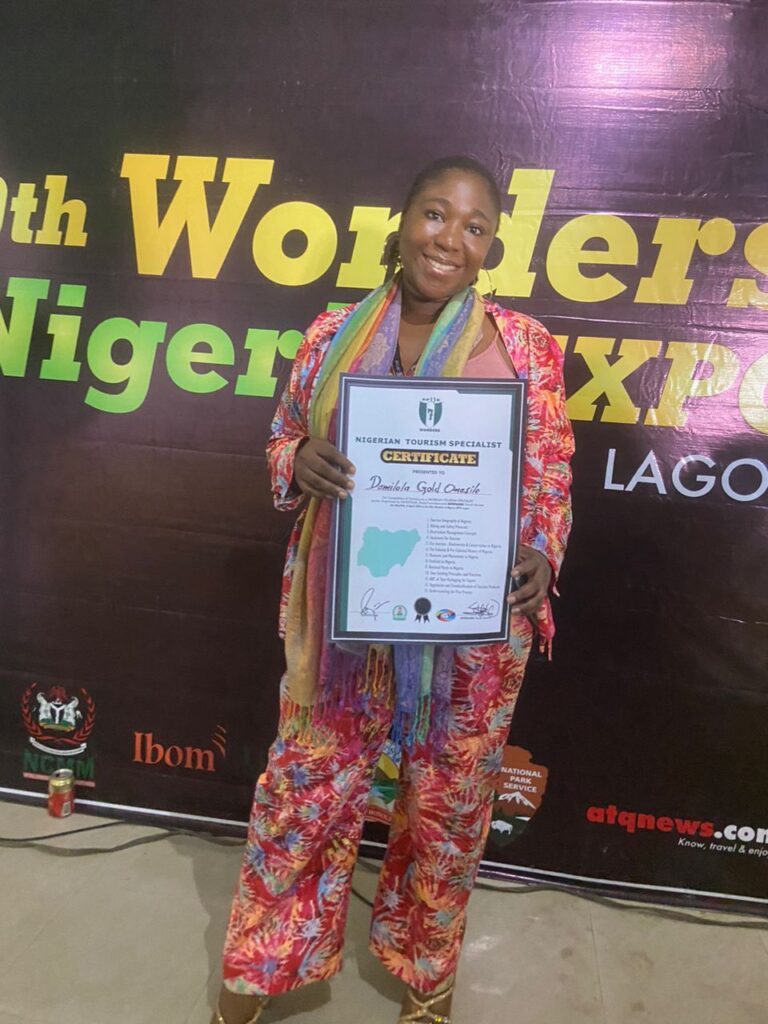My Journey to Becoming a Nigerian Tourism Specialist (By Damilola Onisile)
Introduction
With a BSc in Tourism Management, my career path has surprisingly diverged from my academic background. Instead, I’ve immersed myself in the culinary industry and the broader hospitality and events sectors. Despite my passion for tourism, I hadn’t ventured into a travel/tourism-related job until recently.
When my friend, David Atabo, announced he was looking for someone to sponsor for the Nigerian Tourism Specialist Certification course, I seized the opportunity wholeheartedly. It came at a time when I was contemplating a transition into the travel and tourism industry. Initially, I expected a brief course, maybe an hour or two, but it turned out to be far more comprehensive and enriching.
Course Content
The course surpassed my expectations with an extensive curriculum covering 13 vital topics in Nigerian tourism:
1. Tourism Geography of Nigeria
2. Hiking and Safety Protocols (taught by Mrs. Nana from Jos)
3. Destination Management Concepts
4. Insurance for Tourism
5. Biodiversity and Conservation in Nigeria (Ecotourism)
6. Museums and Monuments in Nigeria
7. Festivals in Nigeria
8. National Parks in Nigeria
9. Tour Guiding Principles and Practices (my favorite course)
10. ABC of Tour Packaging for Export
11. Regulation and Standardization of Tourism Products
12. Understanding the Visa Process
13. The Colonial and Precolonial History of Nigeria
The “Hiking and Safety Protocols” course was the most interactive. The engaging nature of the session, combined with practical demonstrations, made it a highlight. On the other hand, “Tour Guiding Principles and Practices,”taught by Mrs. Wonuola Lamidi, was the most enjoyable and interesting for me. Her depth of knowledge and practical insights provided a solid foundation for understanding the nuances of tour guiding.
Instructors
The interactions with the instructors were particularly impactful. Their teaching styles were both informative and inspiring, facilitating a deeper understanding of each topic. Networking with fellow participants also proved to be a valuable aspect of the course, fostering connections essential in the tourism industry.
Practical Sessions
A highlight of the course was our field trip to the Nigerian National Museum at Onikan. This visit was not only educational but also a vivid experience, exploring artifacts and relics that Nigeria’s rich history. Although I don’t have pictures from the trip yet, I plan to get them from Ufom Udoh, who will be sharing them with me.
Personal Growth
This course was transformative for me. It equipped me with practical knowledge and skills industry applicable to the tourism sector and boosted my confidence in transitioning from the culinary industry to a career in travel and tourism. One challenge was understanding the broader scope of tourism beyond the culinary aspect I was familiar with. I overcame this the actively participating in discussions, asking questions, and seeking resources. I also found it helpful to draw parallels between my culinary experiences and cultural concepts, such as understanding the cultural significance of food and its role in tourism.
For instance, I related the principles of tour guiding to how I present and explain dishes to guests, highlighting their cultural contexts and historical backgrounds. This approach made the new information more relatable and enhanced my ability to envision how food tourism could be developed and marketed.
The Intersection of Food and Tourism
The course profoundly influenced my perspective on travel and tourism. As someone deeply interested in food and travel, I’ve been fascinated by food tourism. My culinary background stems from a desire to immerse myself in diverse cuisines, understand can histories, and learn how they are made. Food is life—it encompasses culture, tradition, and community.
However, during the course, I noticed a significant gap: there was no discussion on food tourism. This realization has driven me to focus on integrating food tourism into the travel industry. My aspiration is to create a company dedicated to food tourism, showcasing culinary delights and hidden gems in places like Lagos. This would involve taking people on culinary tours, introducing them to local foods, and exploring the cultural significance behind each dish.
Discussing this idea with other participants revealed strong interest in collaboration, which was one of the highlights of my experience. This has reinforced my commitment to pioneering food tourism in Nigeria.
Meeting Peers and Enthusiasts
One of the exciting aspects of the course was meeting tour guides and tourism enthusiasts I had only interacted with on social media. Meeting Ufom Udoh, who won the Photography Personality of the Year, was particularly thrilling. She is someone I followed on X (formerly Twitter), and it was exciting to meet her in person. Ufom will also be providing me with the pictures from our trip.
The Traveller’s Awards
On the second day, the Traveller’s Awards were presented, recognizing various contributions to Nigerian tourism. Awards were given for the Best Tourism Photographic Personality of the Year, the Best Tourism Attraction in Nigeria, and the Best Tourism State in Nigeria, which was awarded to Ekiti State. Additionally, 100 tourism enthusiasts, personalities, or businesses were inducted into the Nigerian Tourism Club. I eagerly anticipate being part of this prestigious group next year.
I also hope to win one or two awards for Food Tourism as a writer or in some other capacity. Winning the Food Tourism Personality of the Year would be a dream come true. The awards presentation inspired me to work towards achieving this recognition.
The Nigerian Institute for Tourism and Hospitality also showcased food from different parts of the country during the awards event. While the variety of dishes was impressive, more detailed information about the food would have been beneficial. Explaining the origins, cultural significance, and preparation methods of the dishes would have enriched the experience and provided attendees with a deeper appreciation of Nigeria’s culinary heritage.
Conclusion
I want to extend my heartfelt thanks to my friend David Atabo for his generous sponsorship. This opportunity means so much to me, and I look forward to pursuing more training and eventually launching my own food tourism company. I have already come up with a name for my venture, which is in the pipeline to be launched soon. One of my upcoming projects is “Amala Hangout,” planned for August, by God’s grace.
Once again, a special thank you to Chief Atabo, the founder of ComeMakeWeGo Africa Tourism Foundation. Your support and belief in me are truly appreciated. God bless you for this incredible opportunity.




